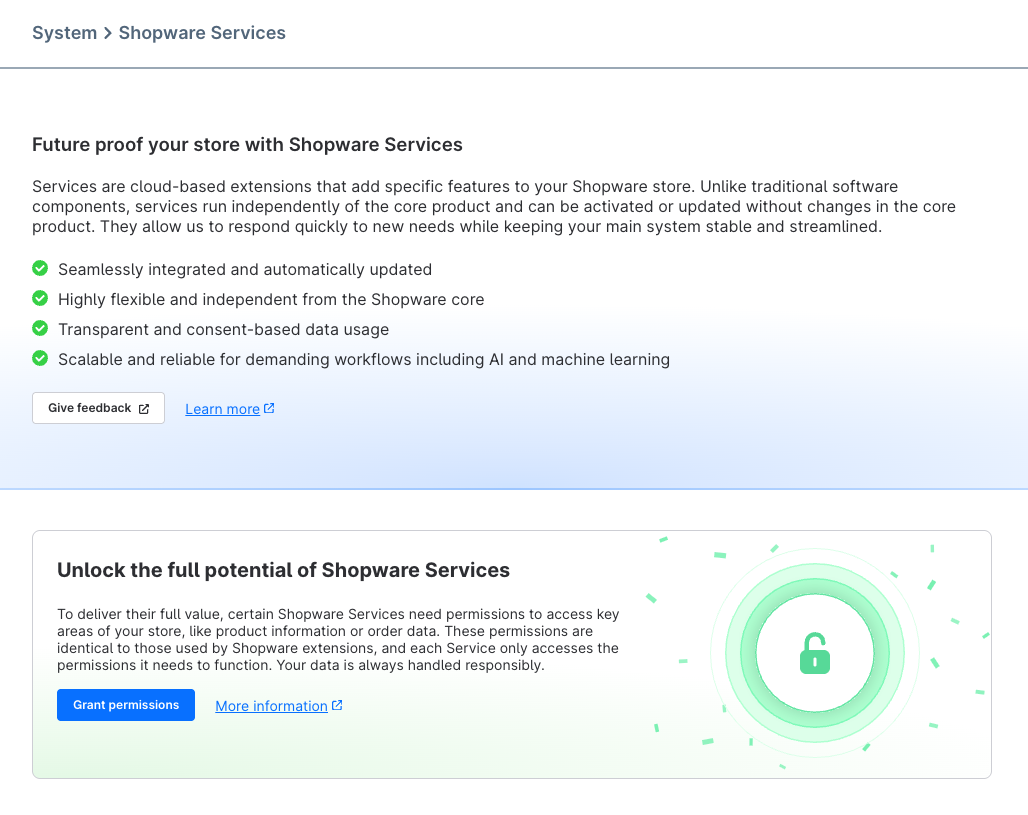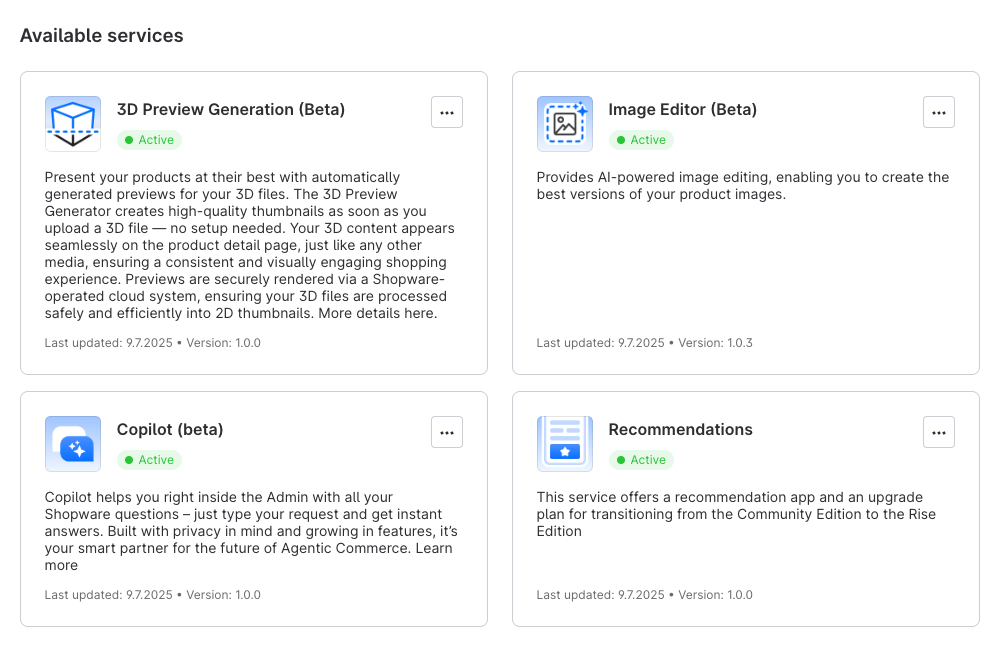Shopware Services
This area provides an overview of Shopware Services, outlining their purpose, functionality, and implications for merchants, developers, and partners. It is designed to offer you clear guidance and transparency about what Services are, how they can be managed, and what data is involved when using them.
What Are Services?
Services are cloud-based extensions developed exclusively by Shopware. They provide specific features and functionalities for Shopware. The application works technically like an App. Meaning they’re connected over APIs and Webhooks and extend the Administration over the meteor SDK. The idea is that a feature provided as a Service feels as native as possible in Shopware.
The key idea behind Shopware Services is to deliver new, Shopware-specific features quickly, flexibly, and without the need for complex core updates. Compared to usual third-party extensions, Services are only a click away to use and update automatically without requiring manual intervention. We design Shopware Services to seamlessly integrate into the Shopware administration interface.
How do Services differ from Apps?
Are Shopware Services like other extensions (App or Plugins) or not? The answer is both yes and no. Shopware differentiates between plugins, apps, and services. Plugins are installed directly in the shop and are closely tied to the core system. Apps operate externally but still require manual installation. Shopware Services are cloud-based applications developed exclusively by Shopware and ready to use right within the Shopware Administration. They complement the Shopware platform as standalone features provided through the cloud, without impacting or becoming part of the core software.
While they technically rely on the app system framework, they behave more like essential system features. This allows them to be activated, scaled, and updated within the Shopware Administration but completely independently of core updates, ensuring they don't impact the Shopware Core itself.
How to use Services
From a technical perspective, Shopware Services are enabled via a central Service Registry, which serves as the interface between merchants, the Shopware Core, and the available services. This registry handles permissions, data usage approvals, and the management of services in the background.
When a new service becomes available through the registry, it is automatically installed in every Shopware environment. The newly available service does not have access to shop data or any sensitive information, if permissions are not granted globally. In this state, it's deactivated.
To activate services that require permissions by using the App System permission system, you must first Opt-In to allow Shopware to assign the technically required permissions for a service. This Opt-In is managed centrally and presented transparently within the Shopware administration. A service can only be used once you’ve given your Opt-In. Each service only receives the exact permissions it needs to function.

Without permissions Services can only display interface or content elements in the Shopware admin of a user session. But they can’t access shop data and cannot affect or change the system.
Technical Permissions
Shopware Services may require access to specific areas of your shop system to work as intended. To make it easier to understand which parts of Shopware a service interacts with, the given Opt-In is based on permission categories.
The documentation of each service shows the used permissions, along with their assigned categories.
If Shopware introduces new permissions in the future that fall within an already approved category, no additional opt-in will be required to avoid interrupting existing service functionality.
The exact permissions that the service requests will be automatically tied to the API-Key that we create for every service on the services activation. This means technically it is ensured that the service always only has the exact permissions it requests. This is the same as the handling for existing store apps already.
Automatic Installation of Services explained
Shopware regularly queries a centralized registry to identify available Services suitable for your store. During this auto-installation process, Shopware retrieves and locally stores only the metadata of these Services, such as their name, URL, and required permissions. Services can embed user interface elements directly into your Shopware Admin interface (via iframe). These embedded elements do not have any access to your shop’s data or other system components by default.
Disabling Services
All Shopware Services are managed centrally and can be individually deactivated or reactivated at any time.
In addition to controlling individual services, Shopware also provides a global switch to deactivate all services and their related functionalities at once. This allows merchants to fully opt out of the entire service layer if needed, without affecting the core functionality of Shopware.
Deactivating a service — whether individually or globally — immediately disables its functionality and prevents any further data processing or interaction with the shop environment until it is reactivated. This also means the service will no longer receive updates, notifications about new features or services will be suppressed, and depending on the service, existing data or historical records may be lost or become inaccessible.
Services that have been deactivated can be reactivated at any time via Settings > Shopware Services. This flexibility ensures that merchants can adapt their service usage to changing business needs.
Data Handling and Privacy in Services
Data Collection for Service Functionality
For Services that require data from you or your Shopware environment to function effectively, we collect and process only the information necessary to deliver the intended features. This data collection is strictly confined to the scope of the Service’s functionality. In such cases, additional consent beyond the Service permissions is not required, as the data processing is integral to the Service’s operation.
Example: If a Service provides enriched order confirmations, it requires access to relevant order and customer information to fulfill this functionality.
Data Collection Beyond Service Functionality
If a service is intended to collect or process data for purposes extending beyond providing the Service’s core functionality, your explicit additional consent is required. This ensures compliance with data protection regulations (e.g. GDPR) and maintains trust. You will be prompted to provide this consent, and you can revoke it at any time. Without such consent, no data beyond what is necessary for the Service’s functionality will be collected, transferred and processed.
Data Consent Management
You can manage your data sharing preferences directly within the Shopware Administration interface. This includes granting or revoking consent for data collection beyond essential Service functionality. The system is designed to respect these preferences, ensuring that data is handled in accordance with the merchant’s choices.
We are committed to safeguarding your data and ensuring that our practices align with legal requirements and best practices. For more detailed information on our data use policies, please refer to our Data Use Details page.
For detailed information about data handling practices for a specific Service, please refer to the individual Service descriptions provided in the sections below.
Core Principles of Services
When developing Services for Shopware, we adhere to the following core principles to ensure they enhance the platform without compromising its integrity:
Services Must Enhance, Not Depend
Shopware’s core software must remain fully capable of building and running an online shop without reliance on any Service or compromising Shopware core functionality.
Graceful Degradation
Merchants’ businesses must not be disrupted if a Service is temporarily offline. Services must be designed to gracefully degrade or fallback without impacting critical shop operations, such as checkout, order processing, or storefront availability.
Freedom of Choice
Merchants and Extension Developers must retain the ability to develop or choose the tools and services that best fit their needs. Avoid lock-in mechanisms. Services should always complement, not replace, alternative approaches or integrations available in the ecosystem.
Scalability & Performance
Our Services are designed to be scalable and performant, ensuring reliability even under high usage.
Transparency
We ensure transparency in all aspects of our Services, clearly communicating their functionalities, operations, and data handling practices.
Data Protection, Privacy & Security
We respect our users’ privacy and ensure that all Services comply with applicable data protection regulations (e.g., GDPR). Security is central to our Service development process, protecting merchants and end customers from potential risks.
UX Constraints of Services
Every Service needs to have at least an interface to inform users of its existence (e.g., Notification, Service Overview element, Context element in a module).
Currently available Services
You can find more information about the currently available Shopware services in the Docs articles. Click on the respective link.
- 3D Preview Generator*
The 3D Preview Generator is a Shopware service that automatically creates preview images for 3D files in .glb format. As soon as a corresponding file is uploaded to Shopware, the service generates a static preview image that can then be displayed in the product listing or on the product detail page, for example. - Image Editor*
Transform your product images with the image editor in no time at all. Precisely cut out products and seamlessly merge them into backgrounds with matching light and shadow effects. - Copilot*
Copilot is a chat-based AI assistant designed to help you manage your store effectively. It helps you find answers to questions about Shopware features, setup or best practices. Whether you are configuring your store, developing plugins or exploring new features. - Shopware plans (recommendations)
In the Community Edition, this service offers you the opportunity to book a Shopware Rise plan in just a few steps to take your business to the next level with new features. - CAD to 3D File Conversion**
With the CAD to 3D service, you can easily transform your CAD files into web-compatible 3D models (GLB) directly within Shopware. The conversion runs seamlessly in the background, enabling you to prepare and manage your 3D assets right in the Media Manager for further use across your storefront.
* is currently available to all customers with a Shopware Rise plan (or higher) from Shopware 6.7.1.0 onwards.
** is currently available to all customers with a Shopware Rise plan (or higher) from Shopware 6.7.6.0 onwards.

